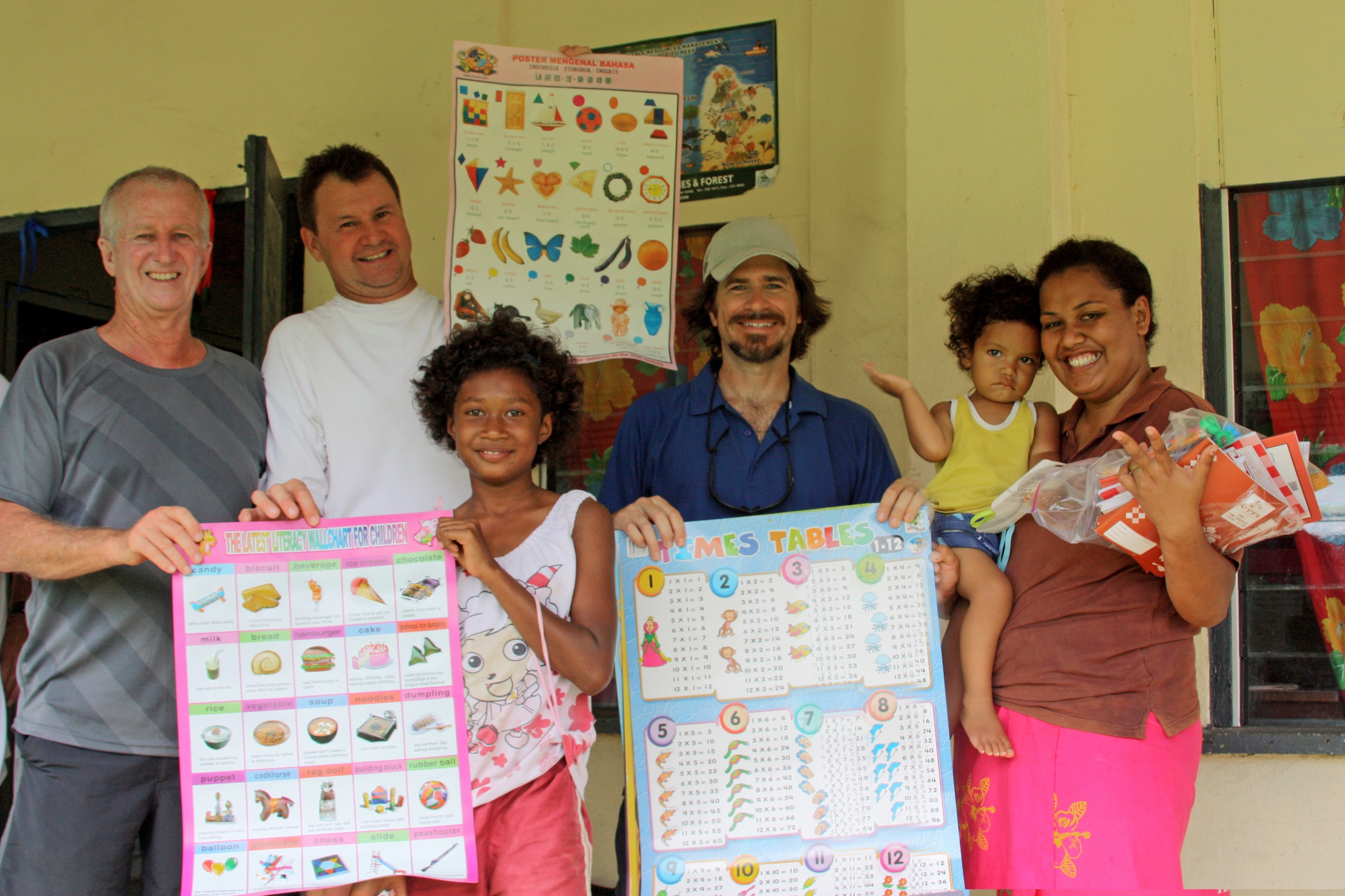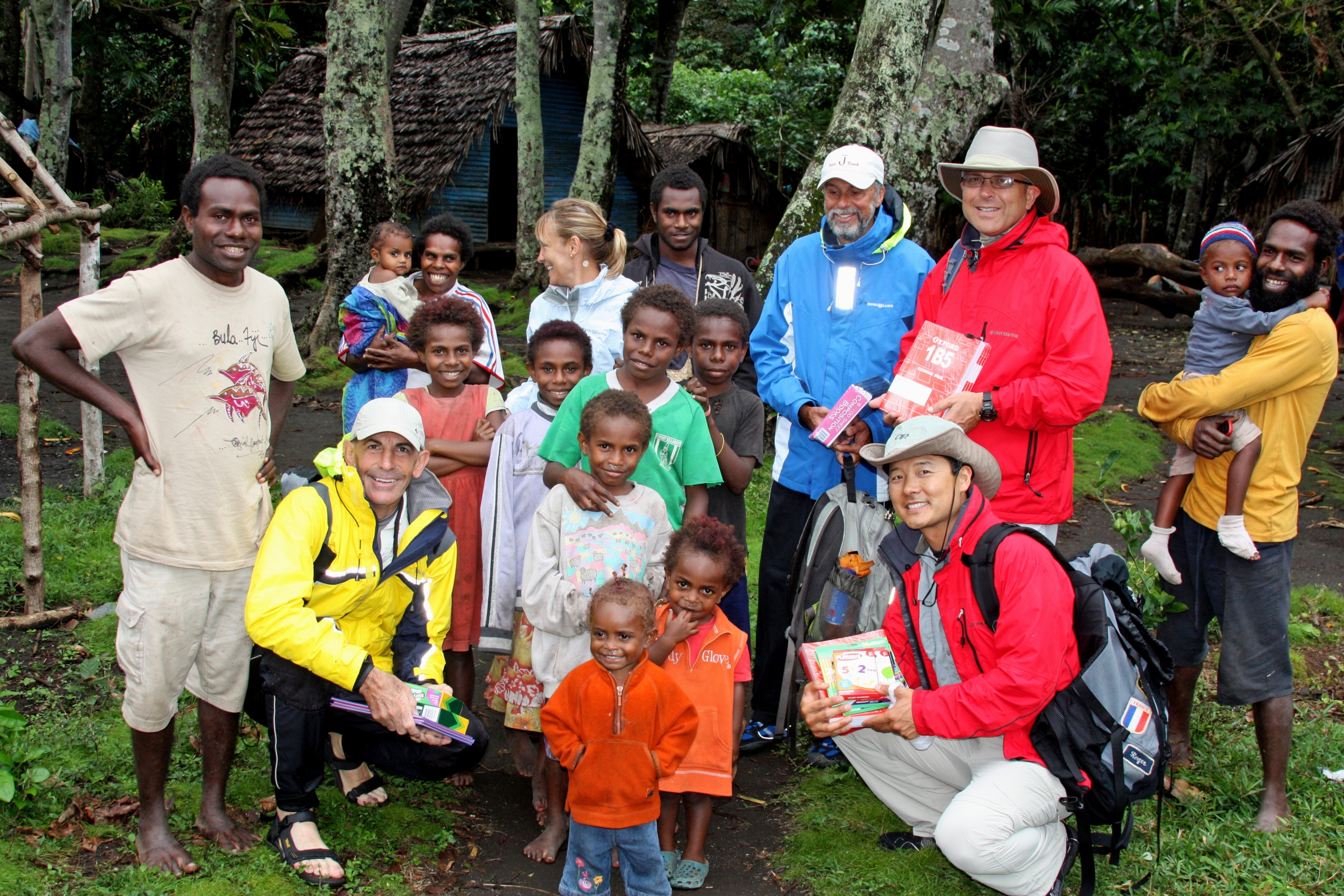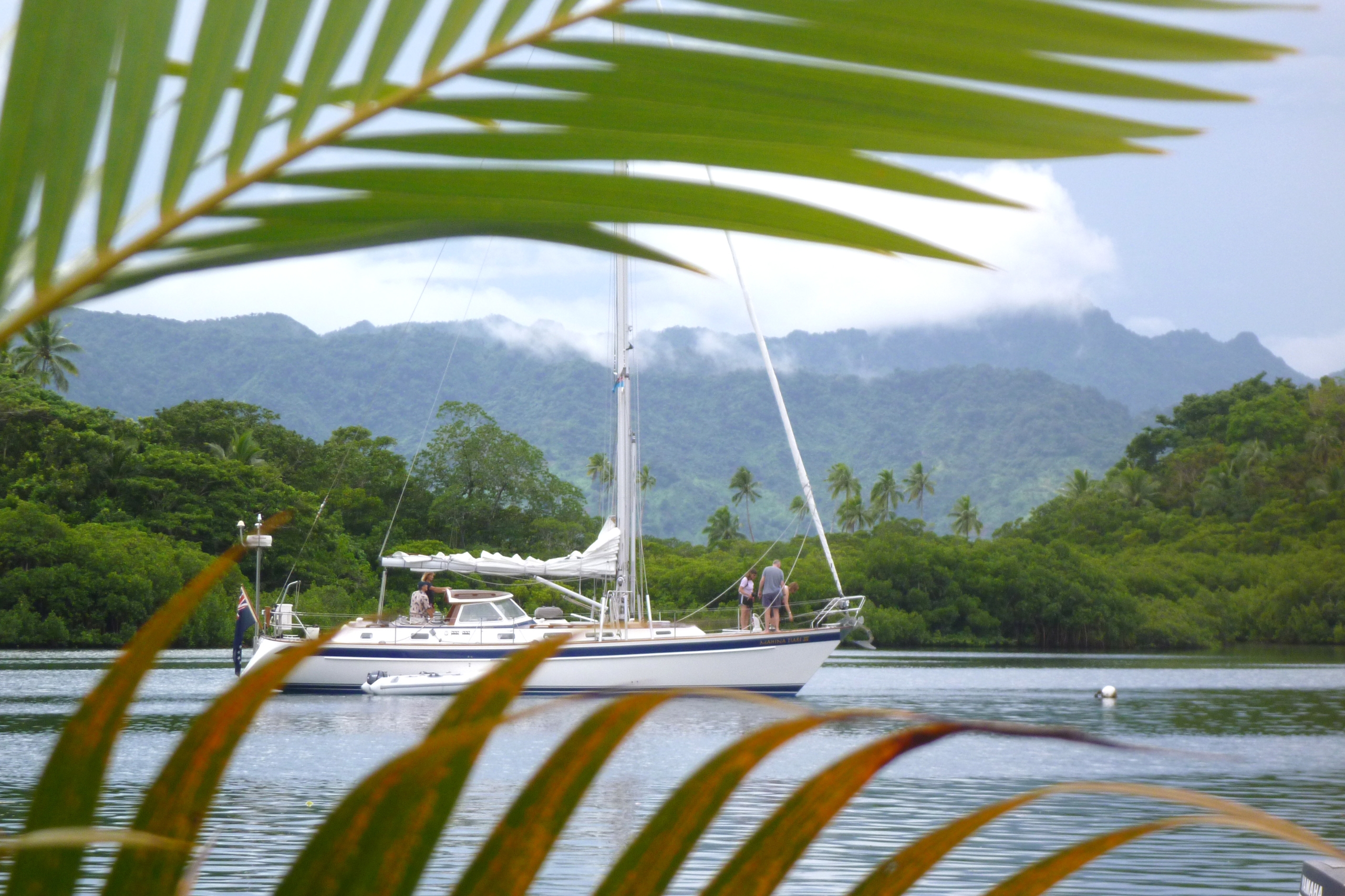OCEANIC OUTREACH:
Making a Positive Impact while Cruising
by John Neal
If you enjoy cruising off the beaten track, there are many ways you can make a positive impact on the places you visit. Whether you’re sailing to less developed islands in the Caribbean, Cape Verde, Mexico or the South Pacific, by researching your destination you can discover ways to make a difference in your experience, the environment and communities.
When I first set off cruising on a Vega 27 at age 21, I had my hands full just keeping the boat off the reefs in the South Pacific and absorbing the incredible experiences. A couple years later after mastering the basics of cruising, I met a doctor on an isolated island who asked if I would sail him to several other remote islands that had no air service. The doctor conducted UN health surveys, provided medical treatment and gave each child a toothbrush for which the communities were very grateful. I found being involved, even in a small way, in working toward improving the quality of life of the people I met very rewarding. No longer was I just a tourist on a yacht, instead I was welcomed at a much deeper level into their community.
When visiting a village, I’m always pleased when I am shown or told of projects that previous yachties have started or contributed to. Now with easy and extensive communication within the cruising community I never hesitate asking village elders, teachers and health care workers if they have any requests I can relay to future visiting yachts.
Gathering Information
Lonely Planet Travel Guides cover nearly 200 countries and do an exceptional job of giving you insights into foreign cultures. Seven Seas Cruising Association bulletins (www.ssca.org) include requests from cruisers in remote areas of how future arriving cruisers can make a difference. www.noonsite.com has posted my requests for schoolbooks and supplies to be purchased and delivered to remote schools and this has proven successful.
In foreign countries you’ll first clear customs in a larger port or town. I always ask clearance officers for recommendations of interesting places to visit. This shows an interest in their country and has resulted in their requests to deliver greetings, letters or packages to family members on distant islands.
When clearing out of Puerto Williams, Chile for Cape Horn, the Chilean naval officer clearing me out asked if I would carry mail and supplies to the three lighthouse keepers on Cape Horn as the patrol boat was not working. I of course agreed, and volunteered that I would also bake a batch of brownies for which the light keepers were very grateful. The next time I cleared out for Cape Horn, the navy asked if I would take a lighthouse keeper, his family, and their supplies to Lennox, an uninhabited island near Cape Horn that had been without a light keeper for two years. We sailed toward Cape Horn with furniture and boxes piled high on Mahina Tiare’s decks and two very wide-eyed children scampering around. Cesar and Lorena became friends and 28 years later, we are still in touch!
Communication
Communication is vital and the returns from learning the basics in local the language far outweigh the time and effort involved.
Village Protocol
When visiting a village for the first time, leave your camera in your backpack and don’t dress in flashy or skimpy clothing. Once ashore ask to speak to the chief or a village elder. Even where not required, ask for permission to anchor, visit ashore and swim in their waters. In some countries tradition requires that visitors present a small gift. In Panama’s San Blas Islands, it is flour or sugar, in the outer islands of Fiji it is a bundle of kava roots and in and New Caledonia fabric is the gift. Don’t hesitate to ask village elders, schoolteachers, or clinic staff if there is anything the village requires.
There are some basic rules on what is not appropriate for your first few visits to an isolated village. Before taking photos, wait until you’ve gotten to know some of the villagers and asking permission will be appreciated. I’ve been on several Caribbean islands where bringing out a camera instantly turns a peaceful encounter hostile. Passing out lollies or coins to village children, even if asked, is not a good idea, nor is serving alcohol to villagers visiting aboard your yacht.
Health Care
Many remote cruising destinations lack basic health care. If there are locally trained health care workers, they are frequently short of basic medical supplies. As a result of requests from nurses and doctors I’ve visited in isolated locations I’ve returned with medical supplies or had supplies delivered by following cruisers. Most of the requested supplies are basic and may include toothbrushes, sterile gauze dressings, roller gauze, topical antiseptic de-germing solution, topical antibiotic cream and ointment, silvadene burn cream and oral antibiotics.
Reading Glasses
Reading glasses may be impossible for locals to obtain in isolated areas. In Panama’s San Blas Islands, the Guna women sew molas (artistic reverse-appliqued panels) as their sole cash income source. As they get older, if they lose their ability to see fine detail and sew, they are unable to help support their families. I’ve purchased hundreds of reading glasses on Amazon inexpensively. Additionally, many Lions Clubs collect and distribute used reading glasses, so check with your local chapter.
School Books and Supplies
I’ve rarely seen parents, village elders and schoolteachers more involved in supporting their children’s education than in three remote villages of Vanuatu’s southernmost islands; Aniytum, Tanna and Erromango. These schools receive very little assistance from the capital, Port Vila and their headmasters asked if we would help them establish the first-ever school libraries. In addition, they asked for school supplies including pens, pencils, exercise books, rulers, world atlas and maps, dictionaries, crayons, marking pens and scissors. I relayed the school’s requests by email to cruisers about to depart from the closest upwind country of Fiji where these goods are easily available at cost from Fijian post offices. A week later five yachts delivered the requested books and supplies, and I returned the following season with many boxes of books for the libraries. Harriet Linskey from Hands Across the Sea provided a contact with wholesalers who allowed me to purchase large quantities of new schoolbooks at non-profit prices.
While transiting the Panama Canal and heading to the San Blas Islands for the first time in 2000, I met cruisers who had just spent several months anchored off Mormake Tupu, a small Guna Indian village. They asked if we would deliver a care package to a special family of artists they had befriended, plus school supplies to the headmaster. They gave me a wish list from the headmaster that included exercise books, pencils, Spanish-English dictionaries, and basic reading books. With the help of a taxi driver in Panama City I visited a large discount store and purchased supplies for Mormake Tupu. In 2017 I returned to the island for the sixth time with more school supplies, reading glasses and toothbrushes for this and neighboring villages.
Recently, my visit to the Cook Islands coincided with their Education Ministry’s Literacy Week. There were several places on the main island of Rarotonga with free books available, and at the end of the week Ministry of Education loaded us up with many cartons of books to take to tiny Palmerston Atoll, population 60 which were eagerly received by the schoolteacher at the island’s open-air school.
Fishing
Reef fish that are easily accessible for villagers are frequently seriously over-fished. I no longer fish or spearfish in inshore waters, however, before making landfall where I know I’ll be visiting villages, we get very serious about pelagic fishing. One of the best gifts cruisers can bring a village is a large pelagic ocean fish like a tuna, mahi mahi or Spanish mackerel. Several times I’ve been asked and have gladly taken villagers sailing specifically to catch larger fish that are inaccessible with dugout canoes and I often get requests for fishing equipment which I carry.
Technical Assistance
Think about how you can help or teach the local people. Some ways that I’ve observed cruisers making a positive contribution include helping design and build clinics, schools, libraries, rainwater collection and storage systems, solar installations and small hydro-electric systems. Repairing equipment such as generators, outboard motors and sewing machines is always welcome.
Reciprocate
People you’ll meet in less developed countries are often friendly and generous, so you’ll want to be prepared with some useful gifts to show your appreciation. Gift ideas include soccer and volleyballs, vegetable seeds, boat repair supplies, sunglasses and a photo of their family. I’ve started yacht/visitor logbooks at several villages, giving the locals a way of remembering visitors and visitors a way of expressing their thanks. Returning decades later, I’ve discovered that these books have become village treasures. Passing out gifts indiscriminately makes the locals think that all cruisers are like Santa Claus and locals may then come to expect or demand gifts from cruisers that follow. If a family has invited you home for a meal, why not invite them out to your boat for tea, juice and popcorn or dinner, or maybe out for a day sail?
The benefits of making a positive contribution to the places you visit are many. Your experiences will be more fulfilling, and the local people will be much more open if they know that you are there to help and learn, not just to take pictures, leave your rubbish and then sail on to the next anchorage. You will also discover a sense of purpose to your cruise, something that frequently eludes many cruisers.
Yet another way of making a positive impact is teaching in regional medical schools or teachers training colleges. I’ve met several cruisers who paused their cruising to teach at University of the South Pacific in Fiji, as well as in American Samoa and in the USVI.
Resources:
www.ssca.org provides a monthly bulletin of up-to-date information in the form of letters from cruisers worldwide and often outline projects cruisers have initiated to make a difference in local communities. To find an extensive list of projects you can help with, go to:
Clean Wake Projects – Seven Seas Cruising Association (ssca.org)
www.handsacrossthesea.org, started by cruisers Harriet and Tom Linskey. Their CLASS (Caribbean Literacy and School Support) program has been helping thousands of children in five island nations for several years. Every year for decades they loaded their catamaran with thousands of books from a dedicated warehouse facility and set sail for the Caribbean. Recently when moored in Jolly Harbour, Antigua, I visited one of the many schools utilizing their CLASS program, and took turns reading to, and being read to, by primary school students. Harriet and Tom have passed the torch to their new CEO, Amanda Sherlip and have sailed to New Zealand.
www.reef.org/derby is combatting the exploding population of recently introduced (into all Caribbean waters) and very invasive lionfish by encouraging divers to spear and eat them. They have extensive education and volunteer fish survey projects and sponsor an annual Florida Keys Lionfish Derby for divers.
www.oceanswatch.org assists Vanuatu and Solomon Islands with marine management, sustainable livelihood projects and environmental education.
www.seamercy.org has a fleet of volunteer catamarans serving as floating health clinics since 2012, traveling as needed to reach and meet the health needs of remote islanders in remote South Pacific islands. Volunteers join for two-week rotations where they provide free medical, dental and eye care to 5-9 remote island communities during their rotation. They are looking for captains with catamarans and medical professionals interested in volunteering.
www.hopefleet.org sails essential supplies, services and hope to children in the Bahamas, Caribbean and Latin America who need it most.
www.floatingdoctors.com is currently based in Panama with outreach to Haiti and Honduras. Their volunteer medical team is building a permanent health and development program for indigenous communities spread across 10,000 square miles of jungle covered mountains and mangrove mazes in the Bocas del Toro region of Panama.
www.zihuatanejo-sailfest.com, www.porlosninos.com is a fund-raising party for the education of disadvantaged children in Zihuatanejo, Mexico held each February and started by Latitude 38’s publisher Richard Spindler. In the true spirit of a rendezvous, vessels begin arriving in November from as far away as Alaska and the Caribbean and drop anchor until February to participate in what is becoming one of Mexico’s premier sailing events, the Zihua Sail Fest is a five-day festival that combines fun and games, heart-felt volunteerism and an outpouring of international friendship. This year’s event raised $234,000 and to date Sail Fest has built 15 new schools.
Barra de Navidad Fiesta de Veleros and Cruise-In Week is just north of and precedes the Zihua Sailfest and has a smaller, but similar program which benefits local schools.
Please forward me any opportunities you come across for cruisers to make a difference: sailing@mahina.com and I’ll post them here.



